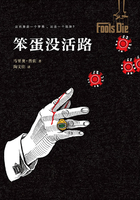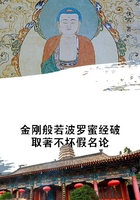"--AND you say that a man cannot, of himself, understand what is good and evil; that it is all environment, that the environment swamps the man. But I believe it is all chance. Take my own case . . ."
Thus spoke our excellent friend, Ivan Vasilie-vich, after a conversation between us on the impos-sibility of improving individual character without a change of the conditions under which men live.
Nobody had actually said that one could not of oneself understand good and evil; but it was a habit of Ivan Vasilievich to answer in this way the thoughts aroused in his own mind by conversation, and to illustrate those thoughts by relating inci-dents in his own life. He often quite forgot the reason for his story in telling it; but he always told it with great sincerity and feeling.
He did so now.
"Take my own case. My whole life was moulded, not by environment, but by something quite different."
"By what, then?" we asked.
"Oh, that is a long story. I should have to tell you about a great many things to make you understand."
"Well, tell us then."
Ivan Vasilievich thought a little, and shook his head.
"My whole life," he said, "was changed in one night, or, rather, morning."
"Why, what happened?" one of us asked.
"What happened was that I was very much in love. I have been in love many times, but this was the most serious of all. It is a thing of the past; she has married daughters now. It was Varinka B---- " Ivan Vasilievich mentioned her surname. "Even at fifty she is remarkably hand-some; but in her youth, at eighteen, she was ex-quisite--tall, slender, graceful, and stately. Yes, stately is the word; she held herself very erect, by instinct as it were; and carried her head high, and that together with her beauty and height gave her a queenly air in spite of being thin, even bony one might say. It might indeed have been deterring had it not been for her smile, which was always gay and cordial, and for the charming light in her eyes and for her youthful sweetness."
"What an entrancing description you give, Ivan Vasilievich!"
"Description, indeed! I could not possibly de-scribe her so that you could appreciate her. But that does not matter; what I am going to tell you happened in the forties. I was at that time a student in a provincial university. I don't know whether it was a good thing or no, but we had no political clubs, no theories in our universities then.
We were simply young and spent our time as young men do, studying and amusing ourselves. I was a very gay, lively, careless fellow, and had plenty of money too. I had a fine horse, and used to go tobogganing with the young ladies. Skating had not yet come into fashion. I went to drinking parties with my comrades--in those days we drank nothing but champagne--if we had no champagne we drank nothing at all. We never drank vodka, as they do now. Evening parties and balls were my favourite amusements. I danced well, and was not an ugly fellow."
"Come, there is no need to be modest," inter-rupted a lady near him. "We have seen your photograph. Not ugly, indeed! You were a handsome fellow."
"Handsome, if you like. That does not mat-ter. When my love for her was at its strongest, on the last day of the carnival, I was at a ball at the provincial marshal's, a good-natured old man, rich and hospitable, and a court chamberlain. The guests were welcomed by his wife, who was as good-natured as himself. She was dressed in puce-coloured velvet, and had a diamond diadem on her forehead, and her plump, old white shoul-ders and bosom were bare like the portraits of Empress Elizabeth, the daughter of Peter the Great.
"It was a delightful ball. It was a splendid room, with a gallery for the orchestra, which was famous at the time, and consisted of serfs belong-ing to a musical landowner. The refreshments were magnificent, and the champagne flowed in rivers. Though I was fond of champagne I did not drink that night, because without it I was drunk with love. But I made up for it by danc-ing waltzes and polkas till I was ready to drop--of course, whenever possible, with Varinka. She wore a white dress with a pink sash, white shoes, and white kid gloves, which did not quite reach to her thin pointed elbows. A disgusting engineer named Anisimov robbed me of the mazurka with her--to this day I cannot forgive him. He asked her for the dance the minute she arrived, while I had driven to the hair-dresser's to get a pair of gloves, and was late. So I did not dance the mazurka with her, but with a German girl to whom I had previously paid a little attention; but I am afraid I did not behave very politely to her that evening. I hardly spoke or looked at her, and saw nothing but the tall, slender figure in a white dress, with a pink sash, a flushed, beaming, dimpled face, and sweet, kind eyes. I was not alone; they were all looking at her with admiration, the men and women alike, although she outshone all of them. They could not help admiring her.
"Although I was not nominally her partner for the mazurka, I did as a matter of fact dance nearly the whole time with her. She always came for-ward boldly the whole length of the room to pick me out. I flew to meet her without waiting to be chosen, and she thanked me with a smile for my intuition. When I was brought up to her with somebody else, and she guessed wrongly, she took the other man's hand with a shrug of her slim shoulders, and smiled at me regretfully.
"Whenever there was a waltz figure in the mazurka, I waltzed with her for a long time, and breathing fast and smiling, she would say, 'En-core'; and I went on waltzing and waltzing, as though unconscious of any bodily existence."
"Come now, how could you be unconscious of it with your arm round her waist? You must have been conscious, not only of your own exist-ence, but of hers," said one of the party.













